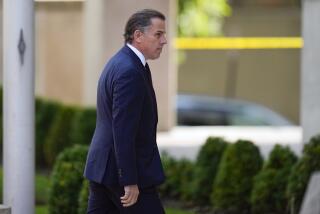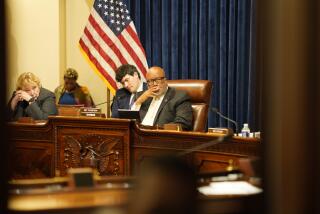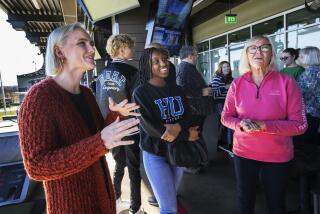Key Witnesses Hesitate to Testify on CIA Role : Iran-Contra: Former agency officials seek immunity. Actions could further delay Robert Gates’ confirmation.
WASHINGTON — Senate investigators said Monday that their attempt to learn more about the role of the Central Intelligence Agency in the cover-up of the Iran-Contra scandal is being delayed by the reluctance of two key witnesses to testify without guarantees of immunity from prosecution.
Over the last week, investigators from the Senate Intelligence Committee have interviewed dozens of current and former CIA officials to determine whether Robert M. Gates, President Bush’s choice to be the new director of the CIA, knew about the agency’s complicity in the cover-up.
Although nothing they have turned up so far has implicated Gates further, sources close to the investigation said that their efforts have been slowed by the refusal of the two most important witnesses, ex-CIA officials Clair E. George and Alan D. Fiers, to testify without promises of immunity.
“They don’t want to talk--they’re referring everything to their lawyers,” one source said. As a result, he said, chances that Congress will act on the Gates nomination in time for him to assume the post before Congress adjourns for its August recess are exceedingly slim.
Indeed, congressional sources say that the investigation is taking so many “complex turns” that it is doubtful all the questions investigators have about Gates can be answered without lengthy hearings that are likely to stretch into the fall.
“Once you start digging, things have a tendency to mushroom exponentially,” one committee source said. “Everybody is focused on Iran-Contra now but I don’t know if, in the end, it is going to be the biggest issue here. . . . Other areas will also have to be explored.”
Sources said that committee members were especially troubled by news reports that the CIA may have tried to impede an investigation of an Arab-owned bank that was seized by regulators last week after the discovery of widespread fraud.
The bank, the Abu Dhabi-based Bank of Credit and Commerce International, was used by the CIA for covert operations--among them the sale of arms to Iran in 1986--at a time when Gates was the agency’s deputy director.
“There are a whole host of things related to . . . the Middle East, to Iran and Iraq,” that have not been revealed publicly yet but which the committee staff is investigating, one source said.
While none of them implicates Gates in any wrongdoing, some of them involve “major intelligence failures that call into question the competence and judgment of senior officials in the intelligence community,” including Gates, the source added.
With President Bush stepping up the pressure on the Senate to confirm Gates, the Intelligence Committee plans to meet Tuesday to review the investigation’s progress. It is expected to decide then whether to open the confirmation hearings formally and give Gates an opportunity to testify before the panel at a hearing scheduled before the August recess.
The new revelations may have prompted some Republicans on the panel to change their views. Until last Friday, GOP members were pushing for the hearings to start immediately.
“We were galled by the fact that Gates was being slowly assassinated by innuendo and rumor without being given the chance to defend himself and we shared the President’s impatience with the delay in getting the hearings underway,” one Republican committee member said.
But another Republican source suggested on Monday that some GOP senators now are having doubts about how to proceed.
Noting that investigators have turned up nothing to disprove Gates’ earlier testimony that he did not know about the illegal diversion of Iran arms sales profits to the Contra rebels in Nicaragua, some Republican members still want to convene the hearings as soon as possible.
But other members, worried that subsequent revelations could prove embarrassing, are leaning toward a delay until they see “what else is out there,” the source added. “I’d have to characterize the situation now as fluid,” he said. “We’re trying to find out what the White House wants us to do.”
The other major decision facing the committee is whether to subpoena Fiers and George and whether to offer them immunity in return for their cooperation.
Formerly the head of the CIA’s Central American operations, Fiers said in federal court last week that he and other senior CIA officials, including George, knew about the diversion months before it became public in November, 1986. Fiers agreed to cooperate with investigators in return for immunity from further prosecution.
Lawrence E. Walsh, the independent counsel leading the Iran-Contra prosecutors, told The Times last week that he would not object to the committee’s questioning Fiers, who wants assurances of immunity from the committee. But Walsh indicated that he would oppose any attempt by the committee to grant immunity to George on grounds that it could frustrate future prosecutions. As deputy director of operations, George supervised all of the CIA’s covert activities from 1984 to 1987.
A statement that Walsh provided the court last week said that Fiers told George “shortly” after late summer of 1986 that the United States was selling arms to Iran and using the proceeds to assist the Contra rebels. George, it said, responded to Fiers: “Now you are one of a handful of people who know this.”
Fiers’ version of events conflicts with George’s testimony that he did not know about the diversion until then Atty. Gen. Edwin Meese III revealed it on Nov. 25, 1986.
More to Read
Get the L.A. Times Politics newsletter
Deeply reported insights into legislation, politics and policy from Sacramento, Washington and beyond. In your inbox three times per week.
You may occasionally receive promotional content from the Los Angeles Times.










